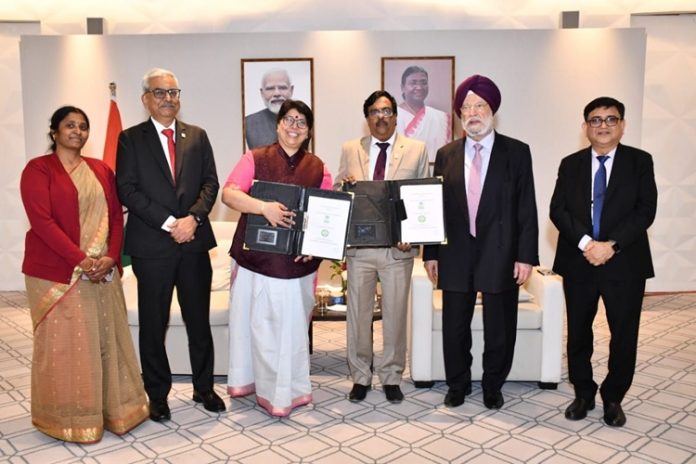At the India Energy Week 2025, India signed multiple strategic agreements and MoUs aimed at enhancing energy security, diversifying supply sources, and fostering innovation in the oil and gas sector. Addressing a press conference on the sidelines of the event, Hardeep Singh Puri, Minister of Petroleum and Natural Gas highlighted these agreements as crucial steps toward a more resilient and sustainable energy future for the country.
In the biofuel sector, BPCL signed an MoU with the National Sugar Institute (NSI), Kanpur, to scale up sweet sorghum-based bioethanol production and build capacity for farmers and industry partners.
The agreement, signed by Chandrasekhar Narayanamurthy, Head (R&D), BPCL, and Seema Paroha Director, NSI, was witnessed by Minister of Petroleum and Natural Gas, Hardeep Singh Puri, Krishnakumar Gopalan, C&MD, BPCL, and Sukhmal Jain, Director Marketing, BPCL.
BPCL has pledged INR 5 crores to support research and development initiatives within this
partnership. The funding will optimise sweet sorghum yields, enhance agricultural practices, and create efficient juice extraction and fermentation methods to boost ethanol production. Additionally, this collaboration will examine the use of leftover biomass for compressed biogas (CBG) and other value-added applications, promoting a comprehensive approach to bioenergy use.
NSI renowned for its expertise in sugar and allied industries, has successfully demonstrated the potential of sweet sorghum for bioethanol production at its in-house facility. NSI is now seeking an industrial partner to scale up this technology.
Sweet sorghum, recognized for its water efficiency and rapid growth cycle, presents a promising alternative to conventional ethanol feedstocks like sugarcane and corn. This initiative is set to significantly enhance India’s energy security, foster sustainable agriculture, and uplift rural economies.
G. Krishnakumar, Chairman & Managing Director of BPCL, highlighted the significance of this initiative, stating, “Developing sweet sorghum as a biofuel feedstock marks a significant stride towards a cleaner and more sustainable future. Our collaboration with NSI aims to establish a dependable and scalable ethanol production framework that benefits our energy sector and farmers alike.”
Through this partnership, BPCL and NSI will perform field trials, technology evaluations, and studies on commercial viability to establish a robust sweet sorghum-based ethanol production system. This collaboration is anticipated to set new standards for sustainable biofuel development in India.
As part of efforts to diversify crude oil imports, BPCL also signed an optional term contract with Petrobras, Brazil, to import up to 6 million barrels of crude. Strengthening India’s transition to a natural gas-based economy, IOCL and ADNOC (UAE) signed a USD 7 billion contract to source 1.2 MMTPA LNG for 14 years starting in 2026, while BPCL and ADNOC entered into a five-year LNG offtake agreement for 2.4 MMT, extendable by another five years. Expanding India’s role as a regional energy supplier, IOCL signed its first LNG export agreement with Nepal’s Yogya Holdings, ensuring the delivery of 1,000 metric tons (TMT) annually via cryogenic trucks through Odisha’s Dhamra Terminal.
On the technical front, ONGC selected BP as the Technical Services Provider for the Mumbai High field, India’s largest offshore oilfield. BP will conduct a comprehensive review of field performance, implement technological improvements, and work to stabilize and enhance production. Additionally, EIL signed an MoU with BP Business Solutions India Pvt. Ltd. To collaborate on refining, pipeline operations, and emission reduction technologies.
In offshore exploration, ONGC Videsh Ltd. And Petrobras signed an MoU to jointly participate in upstream oil and gas projects in Brazil, India, and third countries, exploring opportunities in trading, low-carbon solutions, and digitalization. Oil India Limited and Petrobras also signed an MoU for hydrocarbon exploration in India’s deep and ultra-deep offshore basins, aligning with the government’s Hydrocarbon Exploration and Licensing Policy.
India also took steps toward clean energy with BPCL partnering with Eco Wave Power, Israel, to establish the country’s first wave energy pilot project in Mumbai using wave energy converter technology. Further enhancing hydrocarbon trade, BPCL entered into an agreement with Equinor India Pvt. Ltd. for the purchase of LPG (propane and butane).
The Minister emphasized that these agreements reaffirm India’s commitment to securing affordable, sustainable, and diversified energy supplies while fostering global collaborations in cutting-edge energy solutions. These partnerships will help us achieve our energy transition goals and ensure a robust and resilient energy ecosystem for India.
For more details and in-depth insights, keep reading ChiniMandi, your go-to source for the latest news on the Sugar and Allied Sectors news.










